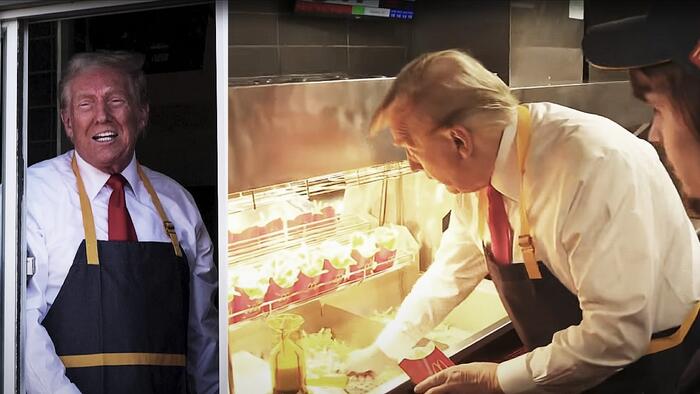In a recent incident at a McDonald’s franchise in Pennsylvania, President Donald Trump’s visit has sparked significant controversy, leading to threats against the establishment. During his visit, Trump engaged with patrons, working at the fry station and serving customers at the drive-thru in what many are calling a strategic political stunt ahead of the election. However, the attention has come with its challenges. Franchise owner Derek Giacomantonio has taken the precaution of hiring private security to ensure the safety of his store and staff due to the influx of threatening messages and phone calls from individuals apparently distressed by Trump’s presence.
Jim Worthington, the organizer of Trump’s visit and a prominent figure in Pennsylvania’s Republican delegation, revealed that there has been a notable increase in threatening communications directed at the franchise as a result of Trump’s activity there. Worthington recounted instances of online and social media threats, indicating a concerning environment born out of strong political divisions. A local resident shared her experience visiting the McDonald’s with her children, noting the presence of armed guards and expressing discomfort upon realizing they were there for security related to Trump’s visit. Such heightened security at a family restaurant underscores the extent to which political tensions have escalated.
In light of the threats, Giacomantonio has opted to maintain the hired security for the foreseeable future. Worthington confirmed that Giacomantonio is managing the financial burden of this additional security himself, highlighting his commitment to maintaining a safe atmosphere for his employees and customers. Although he is reluctant to become a public figure amid the controversy, his decision to absorb these costs points to the challenging realities business owners face in the current political climate. Worthington also emphasized the resilience of the business, indicating that despite the threats and expected boycotts from Trump opposition, McDonald’s operations have remained robust.
Contrary to expectations, community support for the McDonald’s branch has reportedly surged since Trump’s visit. Worthington indicated that many locals have flocked to the restaurant, eager to demonstrate their support and partake in what has become a significant political moment. This unexpected patronage exemplifies the dual nature of the situation, where heightened tensions can lead to backlash, yet also rally support from those aligned with Trump’s political stance. Such dynamics illustrate the shifting landscape of consumer behavior in response to political sentiments.
The aftermath of Trump’s visit has sparked ongoing discussion and analysis in the media, especially among left-leaning commentators who have vocally opposed his actions and the resultant atmosphere. These responses, characterized by significant media coverage, reflect the broader cultural and political divides that are presently influencing public discourse. Criticism from the left suggests persistent unease regarding Trump’s influence and the implications of his public encounters. The attention surrounding this incident serves as an example of how political actions can trigger extensive media narratives, highlighting deeply entrenched divisions in American society.
In summary, Trump’s McDonald’s visit stands as a vivid representation of the contemporary political landscape in the United States, revealing how personal interactions can escalate into larger societal issues. The necessity for security at a fast-food franchise exemplifies the penetrative effects of political polarization on ordinary businesses. As communities navigate these complexities, the uncertain outcome of such engagements continues to evolve, posing questions about the future of political interactions in public spaces and the social obligations of business owners within charged environments. The situation serves as a microcosm of the prevailing national discourse, underscoring the intersections between commerce, politics, and community dynamics.

